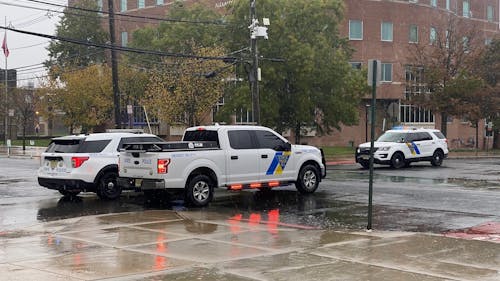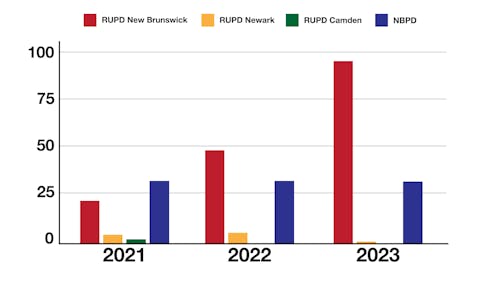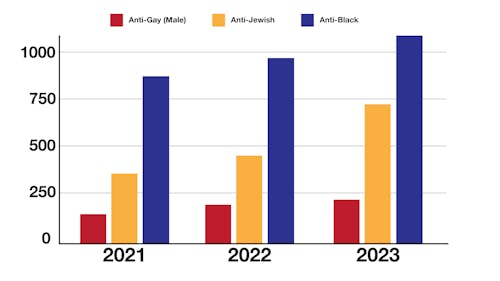Bias incidents at Rutgers spike to 91 in 2023

Reported bias incidents at Rutgers—New Brunswick nearly doubled in 2023 from the previous year, according to statistics released on March 7 by the New Jersey Attorney General's office.
The Rutgers University Police Department (RUPD) reported the most incidents of any other state law enforcement agency, with 91 reported incidents across all campuses in 2023. The next highest number of reports were in Fort Lee and Lakewood, each receiving 55.

Since 2021, bias incidents have increased the most on the New Brunswick campus. Rutgers, across all three campuses, made up approximately 80 percent of all bias incidents at New Jersey universities last year.
Statewide, during 2021, 2022 and 2023, the most common incidents targeted Black people, Jewish people and gay men, according to the report, which identified 34 groups as targets of bias.

Bias incidents are defined by the New Jersey legislature as both suspected or confirmed violations of New Jersey's bias intimidation statute.
The statute defines a victim as somebody who faces intimidation from actions targeting identities around gender, race, complexion, disability status, religion, sexual orientation, gender identity or expression, ethnicity or nationality.
Beginning in 2021, the state began tracking reports submitted by the RUPD as on-campus bias reports were on the rise statewide. These numbers were in addition to the reports handled by the New Brunswick Police Department that may have also involved Rutgers.
In a statement to The Daily Targum, the University said it has rules and guidelines in place for these types of incidents, and the RUPD coordinates with other law enforcement agencies when needed.
"While it is difficult to quickly unpack these statistics, we take seriously every claim of antisemitism, Islamophobia and all forms of bias, intolerance and hate. Rutgers absolutely rejects intolerance based on religion, national origin, race, ethnicity, gender, sexual orientation, ability or political views," the statement read.
Ava Majlesi, associate director of the Miller Center, an associate professor in the Department of Political Science and the director of the Center for Critical Intelligence Studies, said she tries to find positives in challenging situations and that while these statistics are alarming, New Jersey, one of the country's most diverse states, has made significant strides to implement measures against hate.
She also said it is difficult to decide on one factor that may be contributing to the rise in these types of incidents, as there are a multitude of combined factors.
"Rutgers is a microcosm of New Jersey. If bias incidents and hate are on the rise at the state level, it is only a matter of time before those trends trickle down to our campuses," she said. "Clearly, there is so much strife and conflict around the world right now, and the world has become much smaller — especially now that social media has become a part of everyday life."
Majlesi said that while the Miller Center did not work with the state on the annual report, they are working on combating hate crimes by creating training guidelines for law enforcement.
In addition, the center is working on training campus law enforcement specifically to address these issues facing college campuses, she said.
"The Miller Center is also in the process of creating a professional development program to equip campus law enforcement officers and executives with the knowledge, skills and attitudes necessary to effectively address hate crimes, mis- and disinformation and campus conflict, while fostering trust and collaboration with students and faculty they serve," she said.
Gov. Phil Murphy (D-N.J.) said in the press release accompanying the report that the increase in people willing to come forward also contributed to the rise in the number of reports over recent years.
"While we can attribute our state's significant rise in part to an increased willingness to report such acts, it is our duty to ensure New Jerseyans can live and work free from violence, fear and intimidation," Murphy said in the release.
New Jersey Attorney General Matthew Platkin said that the diversity of the state also contributes to the high number of bias incidents and that this issue is nationwide. He said New Jersey is leading in their efforts to fight these types of crimes and acts.
The New Jersey State Police compiled the 2023 bias report results, and all data is preliminary and could change as the report is finalized, according to the release.
Majlesi said the University community should keep in mind that those around them on campus are their peers and not responsible for the war and violence happening elsewhere in the world.
"As difficult as these global issues are to navigate — don't allow that hate and violence to come to your doorstep. Channel that energy in a different, more positive direction," she said. "Engage with others with different viewpoints than you in a respectful dialogue. Get involved with your community to make the positive changes you would like to see. Hate and violence are so incredibly counterproductive — be a force for good."



